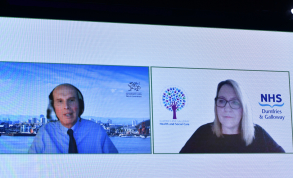HFMA 2021: system working is built on trust, conference told
England will move to a formal structure based around systems from next April, with the introduction of statutory integrated care boards and integrated care partnerships. However, all the devolved nations are already operating with more integrated structures and a panel session set out to explore what worked well and the challenges to closer working.
Wales has been on an integration journey for over a decade with seven local health boards responsible for delivering all NHS healthcare services and three all Wales trusts. It has also implemented both the Wellbeing of Future Generations Act and, more recently the Social Services and Wellbeing Act. And in 2018, it published a long-term plan for health and social care setting out proposals for the health and social care system to work together, with services working as a single system.
Regional partnership boards have also been established to bring together health boards, local authorities and the third sector to meet the care and support needs of local people.
Northern Ireland has integrated health and care trusts. Neil Guckian (pictured), chief executive of Western Health and Social Care Trust, said social workers reported two clear benefits. ‘Firstly, they know immediately if their hospital is under pressure,’ he said, which can help to provide a focus on discharge. ‘And second to none is the seamless service for child and adult safeguarding.’
He said Northern Ireland was working towards being one system that is ‘regionally coherent and locally nuanced’. A regional unit helps to equalise waiting lists and waiting times and get consistent clinical prioritisation, while clinical networks help to match demand and capacity – for example with intensive care managed regionally.
However he said that having services under one organisation did not mean there were no barriers, which could exist between different medical models or between directorates. And there were information barriers to better integration – with community services often struggling to provide rich information.
In Scotland, there are 14 territorial health boards and 31 integrated joint boards, which are responsible for planning health and social care. Nine national outcomes have been identified to measure the success of integration and there has been consultation about the creation of a national care service.
Katy Kerr (pictured on screen) is director of finance for Dumfries and Galloway Health Board and also chief finance officer for the integration joint board. Speaking to the conference remotely, she said that relationships had been the key to progress. ‘We have got the accountability and governance and the arrangements that set up around that,’ she said. ‘But if we didn’t have the relationships and put the energy and time into those relationships, we wouldn’t have seen the success locally that we have.’
The panellists were asked if governance and structure or trust across partners was more important to integration. Steve Elliot (pictured), interim director of finance of the Welsh government Health and Social Services Group – also joining the conference by a video link – said both were needed. ‘But it won’t work if you have the structure and no trust,’ he added.
And Mr Guckian said it was all about the relationships. ‘You get things done through people. You need governance and structures, processes and accountability to underpin it, but ultimately the direction of travel is determined by the relationships,' he said.
Related content
We are excited to bring you a fun packed Eastern Branch Conference in 2025 over three days.
This event is for those that will benefit from an overview of costing in the NHS or those new to costing and will cover why we cost and the processes.